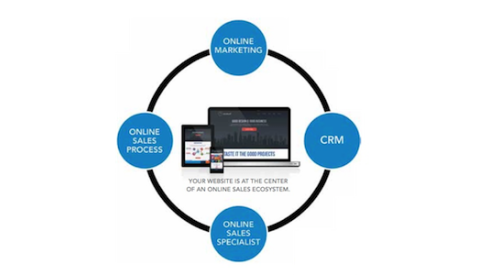I get this question a lot: “What do you think the future of online sales will look like?” It’s easy to see why. Will we be able to talk with Alexa and get our questions answered while looking through our virtual reality glasses, never having to leave the house? Will artificial intelligence be so smart that a computer will be able to answer emails and chats for us? It’s pretty far-out stuff. That day will come at some point. But for the next five to 10 years, technology won’t replace the role of online sales. Instead, it will be used to enhance what an online sales consultant can do. Here’s the future of online sales as we see it.
Online Home Sales Needs More Humans
It’s not uncommon for companies with established online sales programs to see a 40 to 50 percent or more contribution to sales, compared with just 30 percent a few years ago. But even with marketing automation, lead scoring, and smarter CRMs, we need more human beings.
Every year more customers are not only starting their search online but are spending the majority of their entire search online. When they request information or ask a question, the expectation is a response from a real person. If they don’t get it, they move on to a builder who will respond. In a digital world brimming with leads, make sure you have enough people managing the program. There is no way to shortcut this; more leads managed poorly doesn’t equal more sales. (We’ve all seen the casualties of an overworked online sales team, and it’s not pretty.) The purchase of the home is high-stakes, complex, and nuanced. I don’t see Siri managing those relationships anytime soon.
Home Builder CRM, on AI Steroids
Here’s the most exciting part. Artificial intelligence (AI) will help to make the online sales teams of the future more efficient and productive.
When I first started in online sales, we had limited options for lead management. We lacked the automation tools we have today, it required a tremendous amount of manual work to get the desired results, and the tools were not intelligent. Now we have CRMs that notify us when we receive a new lead, automate follow-up, track website visits, provide insights on activity, and score leads based on what’s happening behind the scenes. Follow-up activities that used to take hours now take minutes. With the help of AI, there will be even more progress.
Imagine a system that can analyze thousands of records and data points to match the history and activity to those prospects most likely to take action. When we start work in the morning, we have a list based on that information; multiple leads ready for us to reach out to. Again, AI won’t make the call for us or send the personalized email, but it can help sort out the most promising leads. We are already seeing some of this through CRMs that provide lead scoring and triggers, but the technology will only get smarter and help online sales specialists stay more focused.
Using VR and AR and Presentation Tools to Enrich the Homebuying Experience
Thanks to virtual reality (VR), 360-degree home tours such as Matterport are already widely used. You can build a home virtually and create interactive tours. Using augmented reality (AR), you can drop a house right onto a real lot to see how it would look. That’s invaluable during the customer research phase: The more ways a prospect can experience your homes before they’re built, the better.
But there’s still room for a human being to direct and guide customers through those tours. Showing prospective buyers how they can change or customize the home, for example, and walking them through the tool used to try out those choices, can only be done by a person, who, combined with the sales tool, will enhance the experience. Imagine an online sales specialist guiding the customer via phone or Skype through this experience, with the end goal of seeing the model in person.
Behavioral and Personality Insights for Home Builders Through AI
How would you like to know the personality type of the customer you’re reaching out to? While getting that sort of read is usually something done in person, AI will offer new options. With access to public data and social media profiles, you’ll have advance information before you have a real-life conversation. Tools such as CrystalKnows.com are already doing this by analyzing personalities and behavior patterns and then suggesting better ways to personalize your communication.
More Human Video as a Handy Tool for Home Builders
FaceTime is widely used with personal communication. So why hasn’t it taken off in the business world? I think it’s because of discomfort on both sides: The customer may feel it’s too personal, and the salesperson may be afraid to use it. But video calling is a great tool.
At Do You Convert, we rarely get to see our clients in person, but we connect often via video conference call. In fact, it’s mandatory for rapport-building. Many clients are resistant at first but quickly grow to love the experience of virtual meetings. In the meantime, we encourage clients to create personalized videos to send out to prospects. BombBomb.com is a tool that lets you put a face with the name and send out one-to-one videos. Tools like this have been around since 2008, with great feedback and results from customers, but less than 10 percent of sales professionals use video as an outreach tool.
AI and technology won’t replace human beings, but the online sales specialist who understands and leverages these tools will replace the one who doesn’t. Virtual tools can assist online sales teams in creating excitement and encouraging the customer to visit a model home in person.












